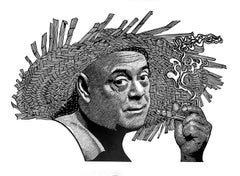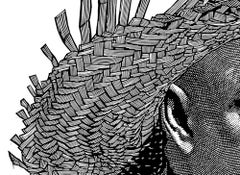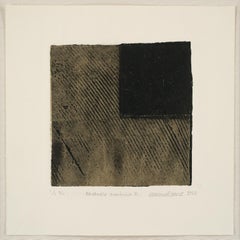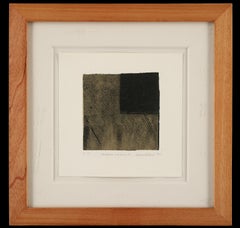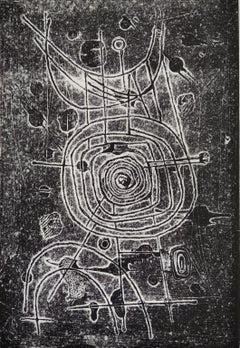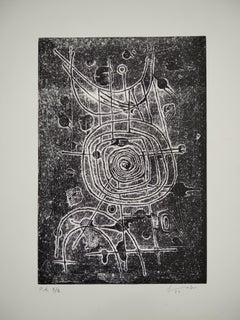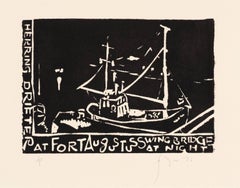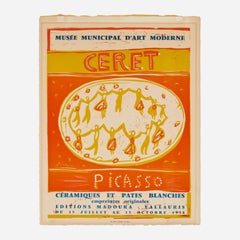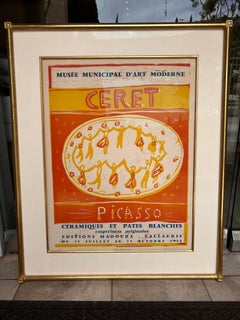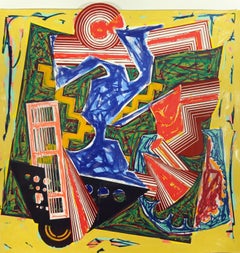By Alex Katz
Located in Fort Lauderdale, FL
Alex Katz was born in Brooklyn, New York in 1927. In 1928, at the outset of the Depression, his family moved to St. Albans, a diverse suburb of Queens that had sprung up between the two wars. Katz was raised in St. Albans by his Russian parents. His mother had been an actress and possessed a deep interest in poetry and his father, a businessman, also had an interest in the arts. Katz attended Woodrow Wilson High School for its unique program that allowed him to devote his mornings to academics and his afternoons to the arts. In 1946, Katz entered The Cooper Union Art School in Manhattan, a prestigious college of art, architecture, and engineering. At The Cooper Union, Katz studied painting under Morris Kantor and was trained in Modern art theories and techniques. Upon graduating in 1949, Katz was awarded a scholarship for summer study at the Skowhegan School for Painting and Sculpture in Maine, a grant that he would renew the following summer.
During his years at Cooper Union, Katz had been exposed primarily to modern art and was taught to paint from drawings. Skowhegan exposed him to painting from life, which would prove pivotal in his development as a painter and remains a staple of his practices today. Katz explains that Skowhegan’s plein air painting gave him “a reason to devote my life to painting.” Katz’s first one-person show was held at the Roko Gallery in 1954. Katz had begun to develop greater acquaintances with the New York School and their allies in the other arts; he counted amongst his friends’ figurative painters Larry Rivers and Fairfield Porter, photographer Rudolph Burckhardt, and poets John Ashbery, Edwin Denby, Frank O’Hara, and James Schuyler. From 1955 to 1959, usually following a day of painting, Katz made small collages of figures in landscapes from hand-colored strips of delicately cut paper.
In the late 1950s, he moved towards greater realism in his paintings. Katz became increasingly interested in portraiture, and painted his friends and his wife and muse, Ada. He embraced monochrome backgrounds, which would become a defining characteristic of his style, anticipating Pop Art and separating him from gestural figure painters and the New Perceptual Realism. In 1959, Katz made his first cutout, which would grow into a series of flat “sculptures;” freestanding or relief portraits that exist in actual space.
In the early 1960s, influenced by films, television, and billboard advertising, Katz began painting large-scale paintings, often with dramatically cropped faces. In 1965, he also embarked on a prolific career in printmaking. Katz would go on to produce many editions in lithography, etching, silkscreen, woodcut and linoleum cut. After 1964, Katz increasingly portrayed groups of figures.
He would continue painting these complex groups into the 1970s, portraying the social world of painters, poets, critics, and other colleagues that surrounded him. He began designing sets and costumes for choreographer Paul Taylor in the early 1960s, and he has painted many images of dancers throughout the years. In the 1980s, Katz took on a new subject in his work: fashion models in designer clothing. In the late 1980s and 1990s, Katz focused much of his attention on large landscape paintings, which he characterizes as “environmental.” Rather than observing a scene from afar, the viewer feels enveloped by nearby nature. Katz began each of these canvases with “an idea of the landscape, a conception,” trying to find the image in nature afterwards. In his landscape paintings, Katz loosened the edges of the forms, executing the works with greater painterliness than before in these allover canvases. In 1986, Katz began painting a series of night pictures—a sharp departure from the sunlit landscapes he had previously painted, forcing him to explore a new type of light. Variations on the theme of light falling through branches appear in Katz’s work throughout the 1990s and into the 21st century.
At the beginning of the new millennium, Katz also began painting flowers in profusion, covering canvases in blossoms similar to those he had first explored in the late 1960s, when he painted large close-ups of flowers in solitude or in small clusters. More recently Katz began painting a series of dancers and one of nudes, which was the subject of a 2011 exhibition at the Kestnergesellschaft in Hanover. Katz’s work continues to grow and evolve today. Alex Katz's work has been the subject of more than 200 solo exhibitions and nearly 500 group exhibitions internationally since 1951. In 2010, Alex Katz Prints was on view at the Albertina Museum in Vienna, which showed a retrospective survey of over 150 graphic works from a recent donation to the museum by Katz of his complete graphic oeuvre. The National Portrait Gallery in London presented an exhibition titled Alex Katz Portraits.
In June 2010, The Farnsworth Art Museum in Rockland, Maine opened Alex Katz: New Work, exhibiting recent large-scale paintings inspired by his summers spent in Maine. Katz was also represented in a show at the Metropolitan Museum of Art, New York, curated by Marla Prather, entitled Facing the Figure: Selections from the Permanent Collection, 2010. In 2009-2010, Alex Katz: An American Way Of Seeing was on view at the Sara Hildén Art Museum, Tampere, Finland; Musée Grenoble, Grenoble, France; and the Museum Kurhaus Kleve, Kleve, Germany. In 2007, Alex Katz: New York opened at the Irish Museum of Modern Art, Dublin, Ireland. The show, which included approximately 40 paintings and aquatints, was the first exhibition to concentrate primarily on Katz’s relationship with his native city.
The Jewish Museum, New York, presented Alex Katz Paints Ada in 2006-2007, an exhibition of 40 paintings focused on Katz’s wife, Ada, dating from 1957 to 2005. It coincided with an exhibition devoted to Katz’s paintings of the 1960s at PaceWildenstein, Alex Katz: The Sixties, on view from April 27 through June 17, 2006 at 545 West 22nd Street. Alex Katz in Maine, an exhibition of landscapes and portraits made over six decades, opened at The Farnsworth Art Museum and Wyeth...
Category
2010s Contemporary Art by Medium: Linocut
